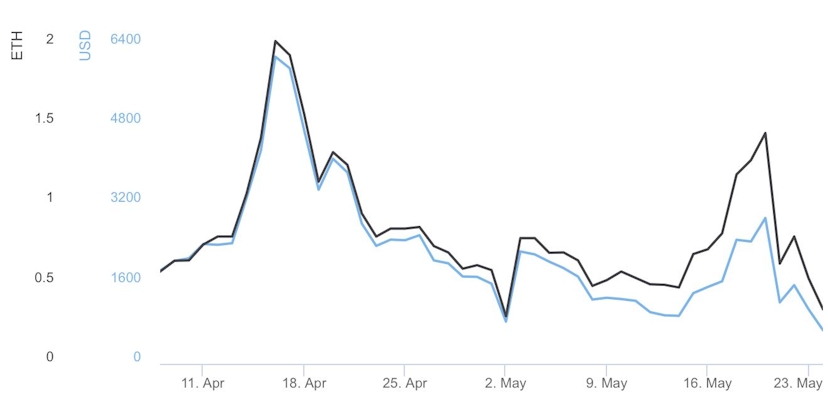Milady NFTs Plummet As Founder Comes Clean
Milady is the most recent example of crypto-native art tarred by its creators’ dirty laundry.
By: Aleksandar Gilbert • Loading...
NFTs & Web3
Charlotte Fang had a confession to make on Saturday morning.
“I was Miya,” the Twitter user once called the mastermind behind the Milady NFT collection, said.
For a brief period in mid-April, the cheapest of the 10,000 generative, doe-eyed, anime avatars “inspired by 00’s Tokyo street fashion” was selling for a little more than $6,000. But the price began to drop, and fell even further after a May 5 story from CoinDesk exploring the Milady founder’s sordid history.

So Charlotte Fang’s weekend mea culpa didn’t have too much of an effect on the price of Miladys. Their floor price was $1,584 early Saturday morning; it was $1,234 on Sunday night.
It briefly dropped below $500 Monday evening, however, after Twitter user 0xngmi, the founder of DefiLlama, published a thread collecting “miya’s writings” and more.
It was the latest twist in a bizarre and complicated story, the most recent example of crypto-native art tarred by its creators’ dirty laundry. It’s also a test of the degree to which consumers are willing to separate art from the artists who created it.
“Unequivocally, my real views hold no room for hate, and I detest abusers & groomers—trolling about it was juvenile, but in reality I’ve never harmed a fly,” Charlotte Fang wrote Saturday. “…The community will take off moving on from the baggage I brought on….”

The Milady NFT collection, a project from the Remilia Collective, launched in August 2021. Less than a month later, a spin-off collection, called Milady, that B.I.T.C.H., raised eyebrows when some of the avatars were spotted on shirts emblazoned with the word “Treblinka”. Anyone who paid attention in high school will remember Treblinka as the name of one of Nazi Germany’s most infamous concentration camps.
In a statement, the Remilia Collective said that it was an honest mistake and that the words on Miladys’ t-shirts were randomly generated.
But were they?
“First, you kill the Jews, who always seek to ruin and exploit other nations,” Miya’s five-step guide on “how to save a nation” begins. Other past essays likened Black people to gorillas and said “a husband is to his wife as a parent is to their child.” Screenshots of tweets show Miya bragging about playing “high-level manipulation games” on “infantilized mindbroken women” and telling one who claimed to have recovered from anorexia she was a “shameless little piggy.”
Charlotte Fang said it was all a joke, but most Milady fans didn’t see it that way.
Community Response
“have loved pretty much everything about miladys up til now,” wrote smoovie420.
Another, YatoshiYatamoto, lauded members of the Milady community as “hilarious, witty and well versed crypto natives” and said they were willing to dismiss claims of Nazism made against Remilia Collective members.
“Everyone with a slightly non-conformist view is accused of being a racist/Nazi in 2022,” they wrote. “The grooming aspect is f!@king weird though. … Honestly I don’t want to support a project that would in any way benefit these people.”
Another said they had tried to wave away such allegations when they first surfaced.
“In a sea of corny ass profit maxis & soulless art, I found a project/community that had real culture & shared similar passions,” wrote gucciprayers. “Everyone was just based and hilarious. The early rumors & hearsay i just dismissed as such. im f@#king gutted & confused.”
The people behind Miladys aren’t the first NFT artists to have faced wild accusations.
Just last week, Yam Karkai, the artist behind the World of Women NFT collection, was accused without evidence of having ties to convicted cult leader Keith Raniere and having drawn inspiration for her art from pictures taken of women shortly before death. World of Women is yet to respond to The Defiant’s request for comment.
More famously, Bored Ape Yacht Club, arguably the most famous NFT collection, was accused of harboring racist undertones and copying Nazi iconography.
Advertisement
Get the best of The Defiant directly in your inbox 💌
Know what matters in Web3 with The Defiant Daily newsletter, every weekday
90k+ investors informed every day. Unsubscribe anytime.